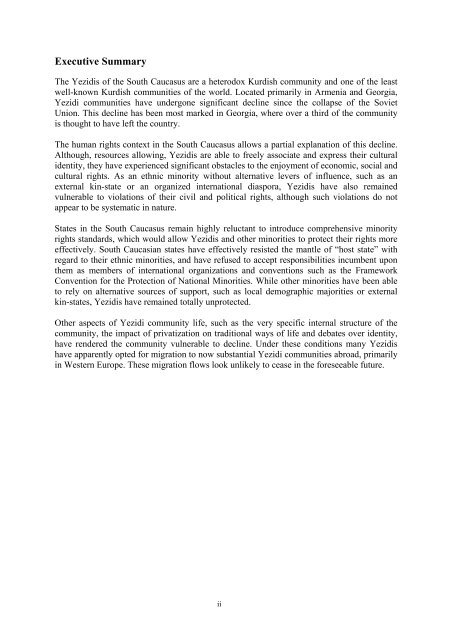The Human Rights situation of the Yezidi minority - UNHCR
The Human Rights situation of the Yezidi minority - UNHCR
The Human Rights situation of the Yezidi minority - UNHCR
You also want an ePaper? Increase the reach of your titles
YUMPU automatically turns print PDFs into web optimized ePapers that Google loves.
Executive Summary<br />
<strong>The</strong> <strong>Yezidi</strong>s <strong>of</strong> <strong>the</strong> South Caucasus are a heterodox Kurdish community and one <strong>of</strong> <strong>the</strong> least<br />
well-known Kurdish communities <strong>of</strong> <strong>the</strong> world. Located primarily in Armenia and Georgia,<br />
<strong>Yezidi</strong> communities have undergone significant decline since <strong>the</strong> collapse <strong>of</strong> <strong>the</strong> Soviet<br />
Union. This decline has been most marked in Georgia, where over a third <strong>of</strong> <strong>the</strong> community<br />
is thought to have left <strong>the</strong> country.<br />
<strong>The</strong> human rights context in <strong>the</strong> South Caucasus allows a partial explanation <strong>of</strong> this decline.<br />
Although, resources allowing, <strong>Yezidi</strong>s are able to freely associate and express <strong>the</strong>ir cultural<br />
identity, <strong>the</strong>y have experienced significant obstacles to <strong>the</strong> enjoyment <strong>of</strong> economic, social and<br />
cultural rights. As an ethnic <strong>minority</strong> without alternative levers <strong>of</strong> influence, such as an<br />
external kin-state or an organized international diaspora, <strong>Yezidi</strong>s have also remained<br />
vulnerable to violations <strong>of</strong> <strong>the</strong>ir civil and political rights, although such violations do not<br />
appear to be systematic in nature.<br />
States in <strong>the</strong> South Caucasus remain highly reluctant to introduce comprehensive <strong>minority</strong><br />
rights standards, which would allow <strong>Yezidi</strong>s and o<strong>the</strong>r minorities to protect <strong>the</strong>ir rights more<br />
effectively. South Caucasian states have effectively resisted <strong>the</strong> mantle <strong>of</strong> “host state” with<br />
regard to <strong>the</strong>ir ethnic minorities, and have refused to accept responsibilities incumbent upon<br />
<strong>the</strong>m as members <strong>of</strong> international organizations and conventions such as <strong>the</strong> Framework<br />
Convention for <strong>the</strong> Protection <strong>of</strong> National Minorities. While o<strong>the</strong>r minorities have been able<br />
to rely on alternative sources <strong>of</strong> support, such as local demographic majorities or external<br />
kin-states, <strong>Yezidi</strong>s have remained totally unprotected.<br />
O<strong>the</strong>r aspects <strong>of</strong> <strong>Yezidi</strong> community life, such as <strong>the</strong> very specific internal structure <strong>of</strong> <strong>the</strong><br />
community, <strong>the</strong> impact <strong>of</strong> privatization on traditional ways <strong>of</strong> life and debates over identity,<br />
have rendered <strong>the</strong> community vulnerable to decline. Under <strong>the</strong>se conditions many <strong>Yezidi</strong>s<br />
have apparently opted for migration to now substantial <strong>Yezidi</strong> communities abroad, primarily<br />
in Western Europe. <strong>The</strong>se migration flows look unlikely to cease in <strong>the</strong> foreseeable future.<br />
ii
















